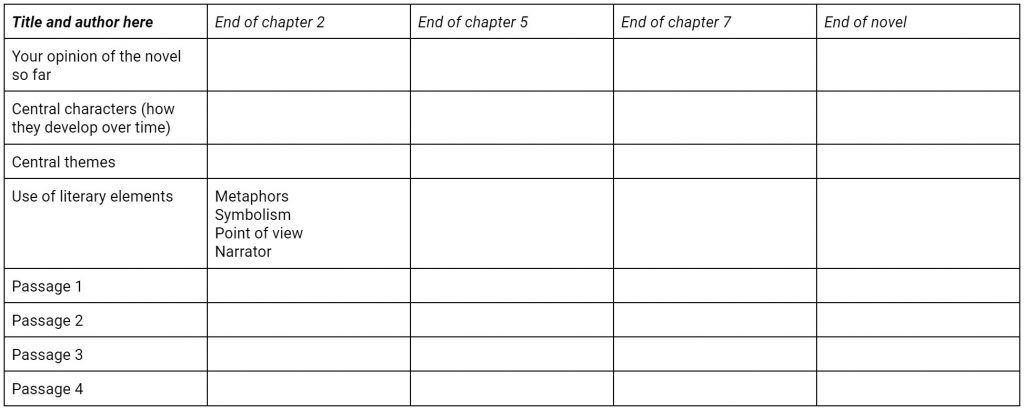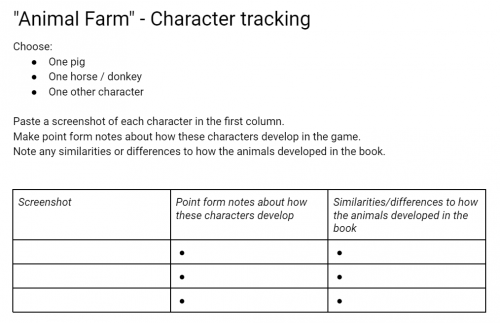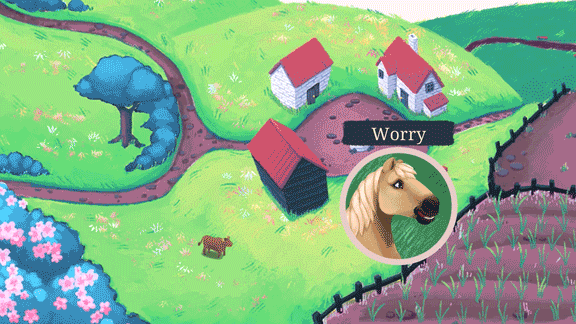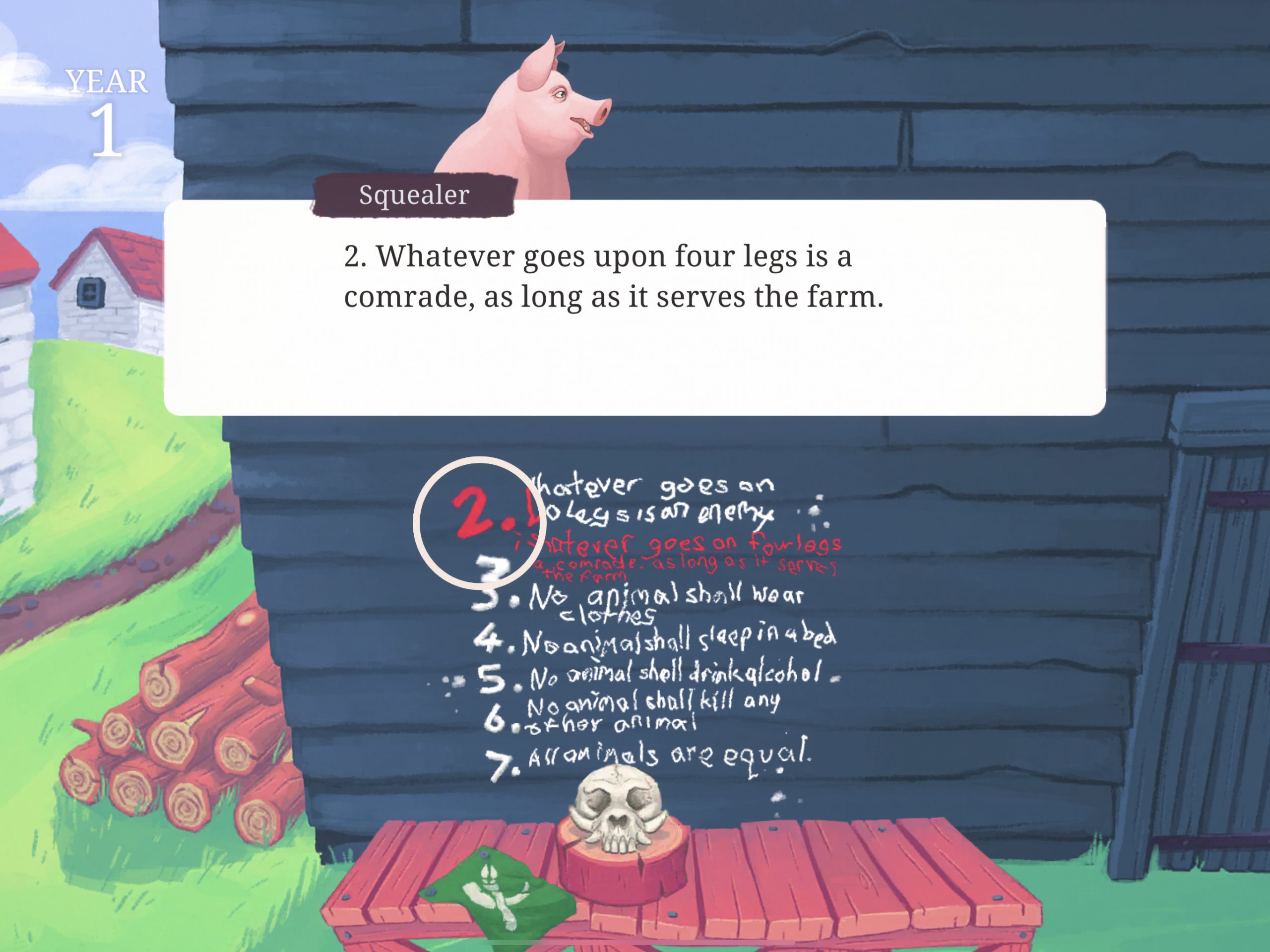Undervisningsforslaget tar utgangspunkt i et opplegg laget av Aleksander Husøy og er etter avtale delt med Creative Commons BY-NC-SA.
«Alle dyr er like, men noen dyr er mer like enn andre.» Dette sitatet kjenner mange fra romanen «Animal Farm», men hva om du kunne endre historien og lage din egen med utgangspunkt i Orwells kjente roman. Hva vil din fortelling bli og likner den på det som skjer i boken?
Om spillet
«Animal Farm» er en spillnovelle som gir spilleren mulighet til å utforske hvordan Orwells historie kunne utviklet seg, om historiens karakterer hadde tatt andre valg. Kunne Manor Farm ha blitt det idealsamfunnet som Old Major drømte om? Ville dyrene vært fri fra tyranni om det var Napoleon som ble fordrevet heller enn Snowball? Var det virkelig nødvendig å arbeide Boxer til døde?
I spillet har dyrene kjempet seg fri fra menneskene. Nå er dyrene de ansvarlige. I dette tekstbaserte spillet må du tildele oppgaver, administrere ressurser, velge hvilke lover som skal gjelde og styre propagandaen deres. Du må bestemme hvilke av dyrene som dyr som må jobbe hardere, gi opp flere ressurser eller møte vanskeligheter til fordel for fellesskapet – og hvilke som vil være «mer like enn andre».
Spillet tar 2-3 timer å spille gjennom, men undervisningsforslaget går over flere uker og dager.
Undervisningsmål
Det er ingen overraskelse at dette undervisningsforslaget tar utgangspunkt i kompetansemål i engelskfaget. I kjerneelementet «Møte med engelskspråklige tekster» inneholder en rekke aktuelle kompetansemål knyttet til undervisningsforslaget.
I samfunnsfag og samfunnskunnskap er det kompetansemål i både kjerneelementet «Medborgarskap og berekraftig utvikling» og det tverrfaglige temaet «Demokrati og medborgerskap» som er aktuelle å trekke inn i tillegg til engelsk.
Slik kan du gjøre det
Dette undervisningsforslaget er en lett omskriving av de instrukser elevene fikk i løpet av de fire ukene de arbeidet med romanen og utvikler Nerial sin spilladaptasjon av Orwells originalverk. De to første ukene arbeidet elevene kun med boken. De påfølgende to, kun med spillet.
Week 1 – day 1

Step 1: Group work (20 minutes)
Define the term «utopia». Look up the term in several dictionaries/encyclopedias. Decide on a definition that your group will use. Spend some time contemplating which characteristics a utopian society created by you would have. All members present their visions to the group.
Based upon the ideas presented in the last task, the group should collectively ”invent” a utopian society. Choose a spokesperson to share your group’s point of view with the entire class.
Step 2: Teacher – Introduction to the novel and the reading log

Step 3: Reading
Read until the end of chapter 2. If you are done reading before the end of class – start filling out the first column of your reading log.
Homework after day 1
Complete reading until the end of chapter 2 and the first column of your reading log.
Prepare for literary discussion the next session by considering the following questions:
- How would you describe the setting of this story?
- How would you describe the following characters?
- Old Major
- Mr. Jones
- Snowball
- Napoleon
- Boxer
- Why are (many) of the animals upset about the way they are treated on Manor Farm?
Week 1 – day 2
Step 1: Literary discussion
Organize into groups of 4 students (or 3-5). Each group selects one group secretary. If the group cannot decide on their own, the person who last celebrated their birthday becomes the group secretary.
Tasks for literary discussion:
- How do you feel about the story so far?
- Summarize key events from chapter 1 and 2.
- Describe the setting of this story?
- How would you describe the following characters?
- Old Major
- Mr. Jones
- Snowball
- Napoleon
- Boxer
- Why are (many) of the animals upset about the way they are treated on Manor Farm?
- How do you think the story will develop?
Step 2: Full class summary of literary discussions
Step 3: Reading / reading logs
Start filling out the second column of your reading logs.
Step 4: Teacher talk about literary terms
Present the following terms: Plot / Theme / Characterization / Character development / Point of view / Narrator / Symbolism
Homework after day 2
Read until the end of chapter 5 and complete the second column of your reading log.
Week 2 – day 1
Continue reading and filling in your reading log. Teacher talk with groups and/or individual students about the story so far.
Homework after day 1
Continue reading at least until the end of chapter 7. Fill in your reading log.
Week 2 – day 2
Step 1: Literary discussion
The student with the most colourful sweater gets to be group secretary. Start by summarizing main points from chapter 5-7. Discuss how central characters have developed over the course of the novel so far:
- How have the commandments changed from Old Major’s original ideas?
- Why are the animals happy in their work, despite the fact that they work like slaves? What is ironic about their reason for being happy?
- What do you think happened to the windmill? Is Napoleon’s explanation reasonable?
- Many of the animals on Animal Farm are functionally illiterate (have only a basic understanding of written language). Does that contribute to the animals accepting Napoleon’s rule? Explain.
- What are the rumors being spread about Animal Farm? How does Napoleon “disprove” them”?
Step 2: Reading
Continue reading until the end of the novel and fill in the final column of your reading log.
- While students are reading. Collect important plot points from the students’ reading logs.
- Use these as the basis for the timeline in step 3.
Step 3: Timeline
Decide upon 10-15 plot points that the class believes to be important. Use these to create a timeline of events/narrative arc on the board.
Week 3 – day 1
Step 1: Literary discussions in groups
- Summarize the final chapters of Animal Farm.
- What is the significance of «Four legs good, Two legs better!».
- Why is it difficult for the animals to tell the difference between the pigs and the human visitors?
- Who are «the good guys» in Animal Farm?
- If this story had a happy ending – how would it end.
- If you were to rewrite this story – What would be different?
Step 2: Narratives
“Reading a book is like re-writing it for yourself. You bring to a novel, anything you read, all your experience of the world. You bring your history and you read it in your own terms.”
Angela Carter
Do you agree with the statement above? Discuss whether you experienced any literature that you have read for school differently from your classmates.
Discuss how narratives are told through games. In what way is this similar or different to narratives told through novels, films or short stories?
Think of a narrative (from any medium) that you have enjoyed. Why did this particular narrative appeal to you? Share with your classmates.
Step 4: Playing the game
Install and play Animal Farm.
Play at least until the start of year 2 by the beginning of next session. Make a note of differences and similarities between the narrative in the book and the narrative in the game. How do your choices influence the narrative?
Fill in the character tracking sheet for the first two years.
Take screenshots of particularly interesting events/choices in your play through.


Week 3 – day 2
Step 1: Catching up on homework
Play until the end of year 2 and fill in the first two columns of your character tracking sheets. If you have completed year 2 already, do not continue playing. Rather continue working on your tracking sheets or preparing for the discussion tasks in part 2.
Step 2: Literary discussions in groups of four
The person with the longest hair takes the role of discussion director, and the person with the shortest hair takes the role of group secretary.
Share and compare the situation in “your” Animal Farm with the rest of the group.
- What is your goal in the game?
- Do you want to play the game as close to the novel as possible?
- Do you want to change anything in particular?
- How do you want your Animal Farm story to end?
You have played the same game, but probably made some different choices:
- Compare the timeline of the novel with the timeline of the game so far. Which chapter of the novel is at the same point in the timeline as the end of Year 2?
- How are your Animal Farm situations similar or different to one another?
- Which choices did you make to create the situation your Animal Farm is in now?
- Are any of your Animal Farms doing better or worse than the others? Explain.
The secretary hands in a summary of about 200 words before you move on to step 3. The entire group is responsible for the quality of your summary.
Step 3:
- Continue playing the game and filling in your tracking sheets and taking screenshots of significant events
Step 4:
- Make sure you have a look at the oral assessment for Animal Farm
- Start considering who you want to work in a group with.
- Keep in mind which parts of the game/novel might be especially relevant to your presentations.
Week 4 – day 1
Step 1: Discussion task in groups of four
The Commandments of Animalism
- Whatever goes upon two legs is an enemy.
- Whatever goes upon four legs, or has wings, is a friend.
- No animal shall wear clothes.
- No animal shall sleep in a bed.
- No animal shall drink alcohol.
- No animal shall kill any other animal.
- All animals are equal.
- Which of these commandments were changed by the end of the novel?
- Which of these commandments were changed by the end of your game?
- Depending on your choices in the game, your Animal Farm stories have developed differently from each other. Who is the author of your Animal Farm story?
- Is the game adaptation “true” to George Orwell’s original work?
- How is adaptation of literature to games different or similar to adaptation of literature to film?
Step 2:
Work in pairs or in groups of three to prepare your oral presentations for next week.
Instructions for oral presentation:
Group size: 2-3 students
Length of presentation: 6 minutes per group member
Reading log from the novel and character tracking sheet from the game needs to be handed in on the date of presentations.
- Your presentation should include:
- A very short plot summary of the novel Animal farm.
- Reflections on how the theme, plot and character development is similar or different in game and novel.
- Direct quotes from the novel and screenshots from the game to back up your claims/analysis.
- Use of the following literary terms tied to the novel and/or game.
- Plot
- Theme
- Characterization/Character development
- Conflict
- Theme
- All members of the group are equally responsible for the content of your presentations.
- All members are expected to speak approximately the same amount of time during your presentation.
- Presentations will be given in front of the teacher + 2-3 other groups.
Dette trenger du
«Animal Farm» er tilgjengelig til Windows, macOS, iOS og Android, og det er lenker til aktuelle spillbutikker på spillets hjemmeside: http://animalfarmgame.com/
Spillet krever ingen spesiell maskinvare og virker på ordinære maskiner. Det koster fra 40-80 kroner alt etter plattform.
Utgaven som er tilgjengelig til Windows og macOS på GOG er DRM-fri og kan installeres på en minnepinne, slik at du kan spille spillet direkte fra denne.
Tips, idéer og forslag
Det er også mulig å la elevene se animasjonsfilmen fra 1954, som er tilgjengelig på YouTube.
Spillpedagognivå – Middels
Teknisk middels – Spillet må kjøpes og installeres på de maskinene som trenger det.
Didaktisk enkelt – Det er enkelt å ta i bruk dette spillet, siden det ligger så tett opp til romanen og hvordan denne allerede blir brukt i undervisning.
Spillmekanisk middels – Det er enkel spillmekanikk som handler om at spillerne må gjøre ulike valg og se hva som skjer videre.


